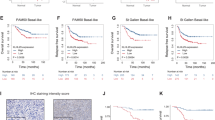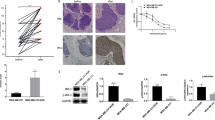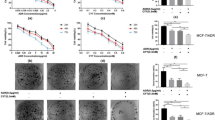Abstract
The overexpression of reduced expression in immortalized cells (REIC)/Dickkopf-3 (Dkk-3), a tumor suppressor gene, induced apoptosis in human prostatic and testicular cancer cells. The aim of this study is to examine the potential of REIC/Dkk-3 as a therapeutic target against breast cancer. First, the in vitro apoptotic effect of Ad-REIC treatment was investigated in breast cancer cell lines and the adenovirus-mediated overexpression of REIC/Dkk-3 was thus found to lead to apoptotic cell death in a c-Jun-NH2-kinase (JNK) phosphorylaion-dependent manner. Moreover, an in vivo apoptotic effect and MCF/Wt tumor growth inhibition were observed in the mouse model after intratumoral Ad-REIC injection. As multidrug resistance (MDR) is a major problem in the chemotherapy of progressive breast cancer, the in vitro effects of Ad-REIC treatment were investigated in terms of the sensitivity of multidrug-resistant MCF7/ADR cells to doxorubicin and of the P-glycoprotein expression. Ad-REIC treatment in MCF7/ADR cells also downregulated P-glycoprotein expresssion through JNK activation, and sensitized its drug resistance against doxorubicin. Therefore, not only apoptosis induction but also the reversal of anticancer drug resistance was achieved using Ad-REIC. We suggest that REIC/Dkk-3 is a novel target for breast cancer treatment and that Ad-REIC might be an attractive agent against drug-resistant cancer in combination with conventional antineoplastic agents.
This is a preview of subscription content, access via your institution
Access options
Subscribe to this journal
Receive 12 print issues and online access
$259.00 per year
only $21.58 per issue
Buy this article
- Purchase on Springer Link
- Instant access to full article PDF
Prices may be subject to local taxes which are calculated during checkout






Similar content being viewed by others
References
Abarzua F, Sakaguchi M, Takaishi M, Nasu Y, Kurose K, Ebara S et al. Adenovirus-mediated overexpression of REIC/Dkk-3 selectively induces apoptosis in human prostate cancer cells through activation of c-Jun-NH2-kinase. Cancer Res 2005; 65: 9617–9622.
Abarzua F, Sakaguchi M, Tanimoto R, Sonegawa H, Li DW, Edamura K et al. Heat shock proteins play a crucial role in tumor-specific apoptosis by REIC/Dkk-3. Int J Mol Med 2007; 20: 37–43.
Edamura K, Nasu Y, Takaishi M, Kobayashi T, Abarzua F, Sakaguchi M et al. Adenovirus-mediated REIC/Dkk-3 gene transfer inhibits tumor growth and metastasis in an orthotopic prostate cancer model. Cancer Gene Ther 2007; 14: 765–772.
Kurose K, Sakaguchi M, Nasu Y, Ebara S, Kaku H, Kariyama R et al. Decreased expression of REIC/Dkk-3 in human renal clear cell carcinoma. J Urol 2004; 171: 1314–1318.
Tanimoto R, Abarzua F, Sakaguchi M, Takaishi M, Nasu Y, Kumon H et al. REIC/Dkk-3 as a potential gene therapeutic agent against human testicular cancer. Int J Mol Med 2007; 19: 363–368.
Tsuji T, Miyazaki M, Sakaguchi M, Inoue Y, Namba M . A REIC gene shows downregulation in human immortalized cells and human tumor-derived cell lines. Biochem Biophys Res Commun 2000; 268: 20–24.
Tsuji T, Nozaki I, Miyazaki M, Sakaguchi M, Pu H, Hamazaki Y et al. Antiproliferative activity of REIC/Dkk-3 and its significant downregulation in non-small-cell lung carcinomas. Biochem Biophys Res Commun 2001; 289: 257–263.
Kobayashi K, Ouchida M, Tsuji T, Hanafusa H, Miyazaki M, Namba M et al. Reduced expression of the REIC/Dkk-3 gene by promoter-hypermethylation in human tumor cells. Gene 2002; 282: 151–158.
Hsieh SY, Hsieh PS, Chiu CT, Chen WY . Dickkopf-3/REIC functions as a suppressor gene of tumor growth. Oncogene 2004; 23: 9183–9189.
Ueda K, Cardarelli C, Gottesman MM, Pastan I . Expression of a full-length cDNA for the human ‘MDR1’ gene confers resistance to colchicine, doxorubicin and vinblastine. Proc Natl Acad Sci USA 1987; 84: 3004–3008.
Giai M, Biglia N, Sismondi P . Chemoresistance in breast tumors. Eur J Gynaecol Oncol 1991; 12: 359–373.
Fujita T, Washio K, Takabatake D, Takahashi H, Yoshitomi S, Tsukuda K et al. Proteasome inhibitors can alter the signaling pathways and attenuate the P-glycoprotein-mediated multidrug resistance. Int J Cancer 2005; 117: 670–682.
Miao ZH, Ding J . Transcription factor c-Jun activation represses mdr-1 gene expression. Cancer Res 2003; 63: 4527–4532.
Nasu Y, Saika T, Ebara S, Kusaka N, Kaku H, Abarzua F et al. Suicide gene therapy with adenoviral delivery of HSV-tK gene for patients with local recurrence of prostate cancer after hormonal therapy. Mol Ther 2007; 15: 834–840.
Nasu Y, Timme TL, Yang G, Bangma CH, Li L, Ren C et al. Suppression of caveolin expression induces androgen sensitivity in metastatic androgen-insensitive mouse prostate cancer cells. Nat Med 1998; 4: 1062–1064.
Watanabe M, Kashiwakura Y, Kusumi N, Tamayose K, Nasu Y, Nagai A et al. Adeno-associated virus-mediated human IL-10 gene transfer suppresses the development of experimental autoimmune orchitis. Gene Ther 2005; 12: 1126–1132.
Watanabe M, Nasu Y, Kashiwakura Y, Kusumi N, Tamayose K, Nagai A et al. Adeno-associated virus 2-mediated intratumoral prostate cancer gene therapy: long-term maspin expression efficiently suppresses tumor growth. Hum Gene Ther 2005; 16: 699–710.
Bai L, Mihara K, Kondo Y, Honma M, Namba M . Immortalization of normal human fibroblasts by treatment with 4-nitroquinoline 1-oxide. Int J Cancer 1993; 53: 451–456.
Batist G, Tulpule A, Sinha BK, Katki AG, Myers CE, Cowan KH . Overexpression of a novel anionic glutathione transferase in multidrug-resistant human breast cancer cells. J Biol Chem 1986; 261: 15544–15549.
Belloc F, Dumain P, Boisseau MR, Jalloustre C, Reiffers J, Bernard P et al. A flow cytometric method using Hoechst 33342 and propidium iodide for simultaneous cell cycle analysis and apoptosis determination in unfixed cells. Cytometry 1994; 17: 59–65.
Maciorowski Z, Delic J, Padoy E, Klijanienko J, Dubray B, Cosset JM et al. Comparative analysis of apoptosis measured by Hoechst and flow cytometry in non-Hodgkin's lymphomas. Cytometry 1998; 32: 44–50.
Bennett BL, Sasaki DT, Murray BW, O'Leary EC, Sakata ST, Xu W et al. SP600125, an anthrapyrazolone inhibitor of Jun N-terminal kinase. Proc Natl Acad Sci USA 2001; 98: 13681–13686.
Rittmaster RS, Thomas LN, Wright AS, Murray SK, Carlson K, Douglas RC et al. The utility of tissue transglutaminase as a marker of apoptosis during treatment and progression of prostate cancer. J Urol 1999; 162: 2165–2169.
Sehgal I, Baley PA, Thompson TC . Transforming growth factor beta1 stimulates contrasting responses in metastatic versus primary mouse prostate cancer-derived cell lines in vitro. Cancer Res 1996; 56: 3359–3365.
Curran S, Murray GI . Matrix metalloproteinases in tumour invasion and metastasis. J Pathol 1999; 189: 300–308.
Ferreira CG, Epping M, Kruyt FA, Giaccone G . Apoptosis: target of cancer therapy. Clin Cancer Res 2002; 8: 2024–2034.
Li H, Lindenmeyer F, Grenet C, Opolon P, Menashi S, Soria C et al. AdTIMP-2 inhibits tumor growth, angiogenesis and metastasis, and prolongs survival in mice. Hum Gene Ther 2001; 12: 515–526.
Ren C, Li L, Goltsov AA, Timme TL, Tahir SA, Wang J et al. mRTVP-1, a novel p53 target gene with proapoptotic activities. Mol Cell Biol 2002; 22: 3345–3357.
Yang X, Wei LL, Tang C, Slack R, Mueller S, Lippman ME . Overexpression of KAI1 suppresses in vitro invasiveness and in vivo metastasis in breast cancer cells. Cancer Res 2001; 61: 5284–5288.
Krupnik VE, Sharp JD, Jiang C, Robison K, Chickering TW, Amaravadi L et al. Functional and structural diversity of the human Dickkopf gene family. Gene 1999; 238: 301–313.
Mao B, Wu W, Davidson G, Marhold J, Li M, Mechler BM et al. Kremen proteins are Dickkopf receptors that regulate Wnt/beta-catenin signalling. Nature 2002; 417: 664–667.
Hoang BH, Kubo T, Healey JH, Yang R, Nathan SS, Kolb EA et al. Dickkopf 3 inhibits invasion and motility of Saos-2 osteosarcoma cells by modulating the Wnt-beta-catenin pathway. Cancer Res 2004; 64: 2734–2739.
Kuphal S, Lodermeyer S, Bataille F, Schuierer M, Hoang BH, Bosserhoff AK . Expression of Dickkopf genes is strongly reduced in malignant melanoma. Oncogene 2006; 25: 5027–5036.
Kawano Y, Kitaoka M, Hamada Y, Walker MM, Waxman J, Kypta RM . Regulation of prostate cell growth and morphogenesis by Dickkopf-3. Oncogene 2006; 25: 6528–6537.
Cudna RE, Dickson AJ . Endoplasmic reticulum signaling as a determinant of recombinant protein expression. Biotechnol Bioeng 2003; 81: 56–65.
Herr I, Debatin KM . Cellular stress response and apoptosis in cancer therapy. Blood 2001; 98: 2603–2614.
Mutoh K, Tsukahara S, Mitsuhashi J, Katayama K, Sugimoto Y . Estrogen-mediated post transcriptional down-regulation of P-glycoprotein in MDR1-transduced human breast cancer cells. Cancer Sci 2006; 97: 1198–1204.
Li J, Xu LZ, He KL, Guo WJ, Zheng YH, Xia P et al. Reversal effects of nomegestrol acetate on multidrug resistance in adriamycin-resistant MCF7 breast cancer cell line. Breast Cancer Res 2001; 3: 253–263.
Acknowledgements
This study was supported by a grant from the Ministry of Education, Culture, Sports, Science and Technology's FY2006 ‘Creation of Innovation Centers for Advanced Interdisciplinary Research Areas’ Scheme in JAPAN. We thank Prof. Kenneth H. Cowan (Derector, Eppley Institute for Research in Cancer and Allied Diseases, UNMC) for the MCF7/ADR cell donation and Hideo Ueki (Okayama University) for his technical assistance. We also thank Prof. Yoshikazu Sugimoto (Department of Chemotherapy, Kyoritsu University of Pharmacy, Tokyo, JAPAN) who kindly provided the MCF-7/MDR cell line.
Author information
Authors and Affiliations
Corresponding author
Rights and permissions
About this article
Cite this article
Kawasaki, K., Watanabe, M., Sakaguchi, M. et al. REIC/Dkk-3 overexpression downregulates P-glycoprotein in multidrug-resistant MCF7/ADR cells and induces apoptosis in breast cancer. Cancer Gene Ther 16, 65–72 (2009). https://doi.org/10.1038/cgt.2008.58
Received:
Revised:
Accepted:
Published:
Issue Date:
DOI: https://doi.org/10.1038/cgt.2008.58
Keywords
This article is cited by
-
Novel extracellular role of REIC/Dkk-3 protein in PD-L1 regulation in cancer cells
Journal of Molecular Medicine (2023)
-
Effect of isoflavones on breast cancer cell development and their impact on breast cancer treatments
Breast Cancer Research and Treatment (2021)
-
Down-regulation of MDR1 by Ad-DKK3 via Akt/NFκB pathways augments the anti-tumor effect of temozolomide in glioblastoma cells and a murine xenograft model
Journal of Neuro-Oncology (2018)
-
Novel REIC/Dkk-3-encoding adenoviral vector as a promising therapeutic agent for pancreatic cancer
Cancer Gene Therapy (2016)
-
Adenovirus vector carrying REIC/DKK-3 gene: neoadjuvant intraprostatic injection for high-risk localized prostate cancer undergoing radical prostatectomy
Cancer Gene Therapy (2016)



